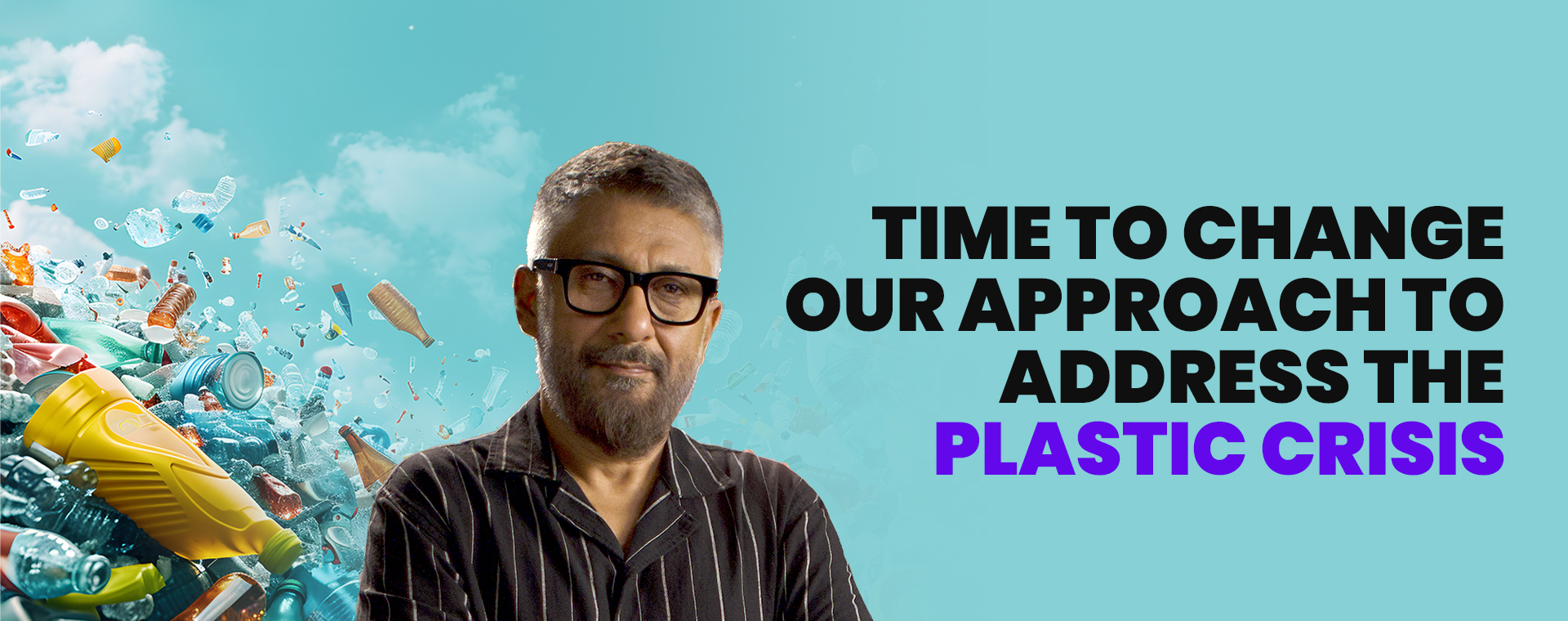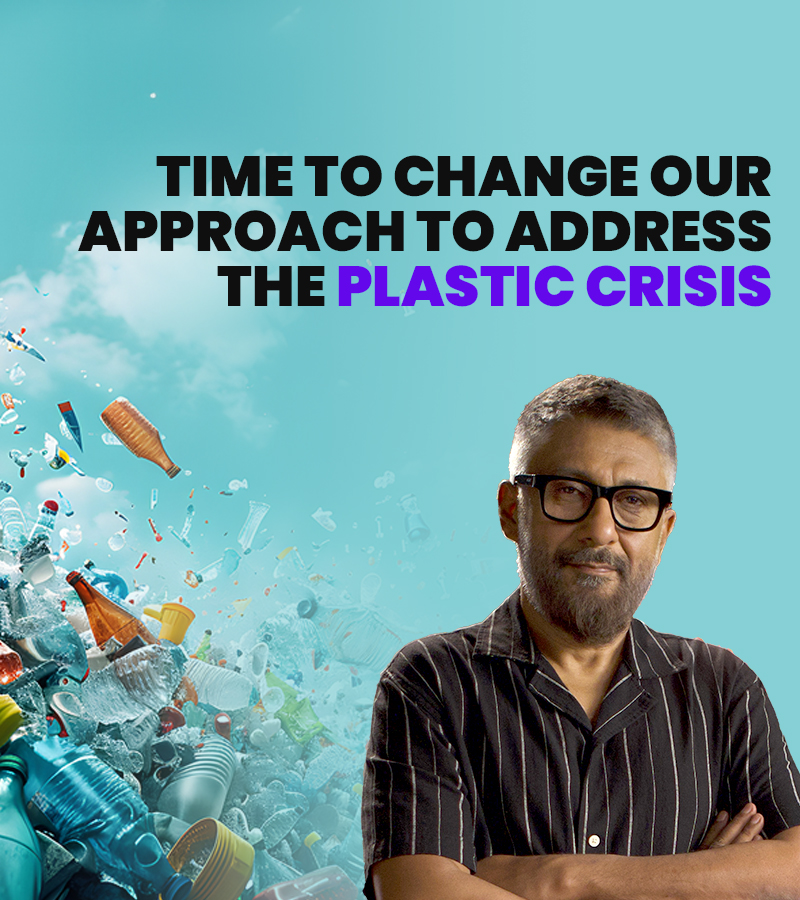

Beyond Recycling: Redesigning Our Approach to Combat the Plastic Menace
Unwrap the battle against plastic pollution with creative solutions and a call to action.
In a world increasingly burdened by the consequences of its own progress, the plastic problem stands out as a stark symbol of our environmental challenges. Once hailed as a marvel of modern science for its versatility and durability, plastic has become an ecological nightmare, suffocating our planet under mountains of waste that the Earth cannot digest. The economic implications of this crisis are also significant, with the cost of plastic pollution estimated to be around $ 13 billion annually. While noble in its intent, the recycling narrative needs to be revised in the face of today’s staggering volumes of plastic waste. As we navigate this crisis, it’s time to radically redesign our approach towards plastic use, production, and disposal. This article, inspired by the thought-provoking insights of Vivek Ranjan Agnihotri, delves into the urgent need for systemic change and innovative solutions to address the plastic menace.
The Plastic Predicament: A Global Crisis
Plastic pollution has infiltrated every corner of our planet, from the deepest oceans to the highest mountains. The statistics are alarming: millions of tons of plastic are produced annually, with a significant portion ending up in landfills or the natural environment, where they can take hundreds of years to decompose. The consequences of this pollution are dire: wildlife entanglement, ingestion of plastic particles, and the contamination of our food chain are just the tip of the iceberg regarding the environmental havoc wreaked by plastic. If we don’t take immediate and drastic action, the situation will only worsen, threatening not just our environment but also our health and the health of future generations.
The Limitations of Recycling
Recycling, once the beacon of hope in our fight against plastic pollution, has hit a critical bottleneck. The infrastructure for recycling is overwhelmed, and we need to catch up with the ever-growing avalanche of plastic waste. Moreover, not all plastics are recyclable, and the process can be energy-intensive and costly. The harsh reality is that we cannot recycle our way out of this crisis. The solution lies not in finding bigger bins or more hands to sort the waste but in addressing the root of the problem: our dependence on plastic.
Redesigning Our Relationship with Plastic
Rethinking Design: The journey towards a sustainable future begins at the drawing board. Manufacturers must prioritize eco-friendly materials and design products for longevity, repairability, and, ultimately, recyclability. This approach is at the heart of a circular economy, where products are designed to be reused and repurposed, thereby reducing the need for new production and minimizing waste. Embracing the principles of a circular economy can significantly reduce plastic waste and contribute to a more sustainable future.
Innovating Alternative Materials: Innovation is critical in our quest for sustainable alternatives to plastic. Research and development into biodegradable, compostable, and sustainable materials must be accelerated. For instance, plant-based bioplastics, such as those made from corn or sugarcane, are gaining popularity as a sustainable alternative to traditional plastics. Similarly, innovative packaging solutions like edible water bottles, made from seaweed, offer a promising solution to single-use plastic bottles. These examples demonstrate the vast and largely untapped potential for alternatives to plastic.
Legislation and Policy Change: Governments play a pivotal role in this transformation through legislation that curbs single-use plastics and incentivizes sustainable practices. Policies promoting research into alternative materials and stricter regulations on plastic production and waste management can drive a significant shift toward sustainability.
Consumer Awareness and Action: You hold the power of change. By making conscious choices, advocating for sustainable practices, and supporting businesses that prioritize the environment, you can drive the demand for eco-friendly alternatives and encourage companies to rethink their use of plastic. Your actions can make a significant difference in the fight against plastic pollution.
The Path Forward: A Collective Endeavor
Addressing the plastic menace requires a concerted effort from all sectors of society. Businesses must innovate and adopt sustainable practices, governments enforce meaningful policies, and individuals should embrace a more environmentally conscious lifestyle. Education and awareness are crucial in fostering a culture of sustainability, where we understand the impact of our choices and are empowered to make a difference.
Embracing Zero-Waste Lifestyles
A zero-waste lifestyle emerges as a beacon of hope and transformation in the quest to conquer the plastic menace. This approach goes beyond recycling, advocating for a radical reduction in waste generation. It’s about reevaluating our daily habits and making conscious choices to minimize our environmental footprint. Individuals can significantly reduce plastic waste by adopting reusable alternatives to single-use plastics—such as water bottles, shopping bags, and straws—to support bulk-buying and packaging-free products. Moreover, composting organic waste, repairing and upcycling items, and choosing products with minimal packaging are steps in the right direction. By integrating zero-waste practices into our lives, we address the plastic problem and inspire a broader cultural shift towards sustainability.
The Role of Technology in Solving the Plastic Crisis
Technology holds untapped potential in addressing the plastic crisis. Innovations in waste management, such as intelligent recycling bins and sorting robots, can enhance the efficiency of recycling processes. Meanwhile, advances in chemical recycling technologies offer promising methods to convert plastic waste into valuable resources, thereby closing the loop of the circular economy. Furthermore, digital platforms and apps can be pivotal in educating the public, promoting sustainable habits, and adopting zero-waste practices. By leveraging technology, we can find scalable and practical solutions to the plastic challenge, driving progress towards a sustainable future. This potential for technological solutions should inspire hope in our fight against plastic pollution.
A Global Call for Change
The fight against plastic pollution is not confined by geographical boundaries—it is a global challenge that demands global solutions. International cooperation and knowledge sharing are crucial in developing and implementing strategies to combat the plastic menace. Agreements like the Global Treaty to End Plastic Pollution, a landmark international agreement aimed at significantly reducing plastic pollution by 2030, signify a collective acknowledgment of the problem and a commitment to action. However, the success of such initiatives relies on the participation of all nations, industries, and communities. We can foster a global movement towards a plastic-free planet by uniting in this cause, sharing innovations, and learning from each other’s experiences.
Conclusion: Forging a Sustainable Path Forward
The path forward is evident as we stand at the crossroads of environmental crisis and opportunity. The fight against plastic pollution calls for a holistic approach, encompassing redesign, innovation, policy change, consumer action, and global cooperation. Inspired by Vivek Ranjan Agnihotri’s advocacy for critical thought and transformative action, let us rise to the challenge. Together, we can redefine our relationship with plastic, embracing sustainable alternatives and practices that honor the health of our planet. It’s a monumental task, but with collective willpower, creativity, and perseverance, we can forge a sustainable path, ensuring a vibrant, thriving Earth for future generations. Your action, no matter how small, is crucial in this collective endeavor.






